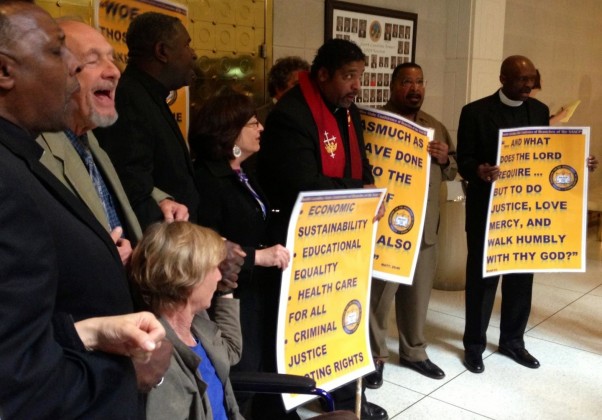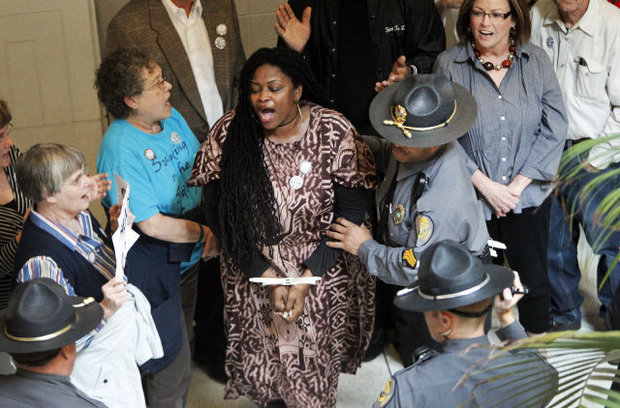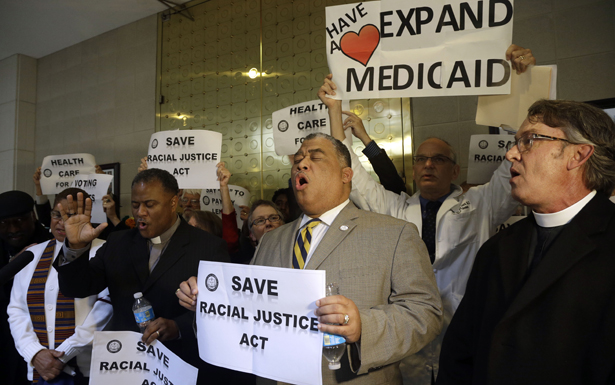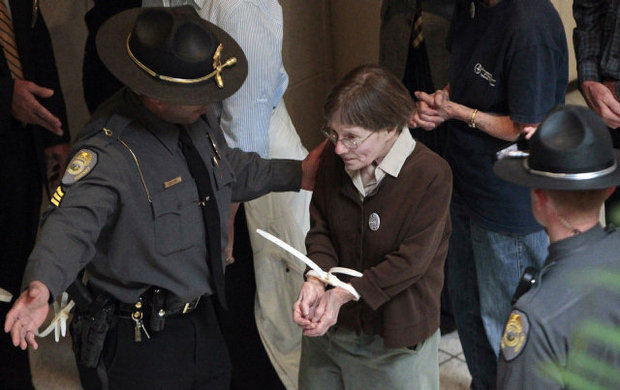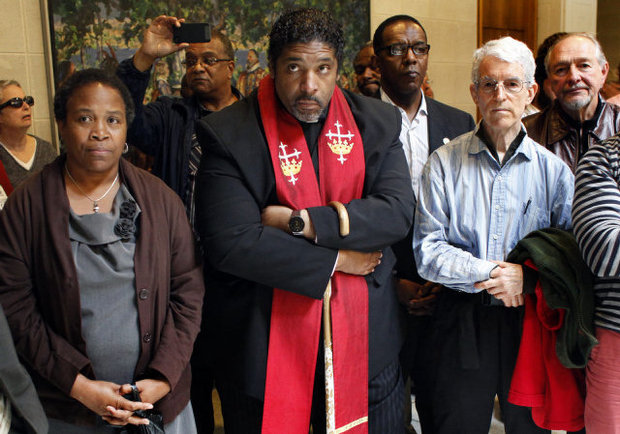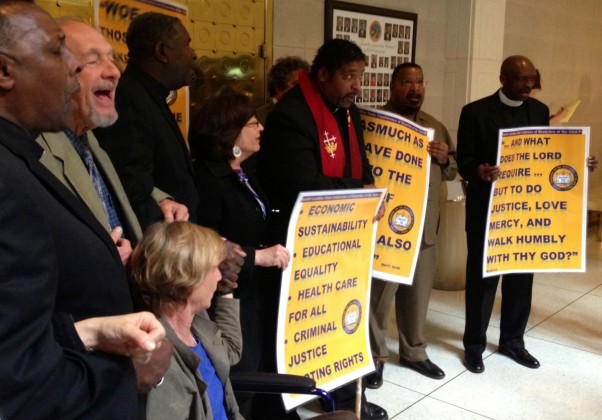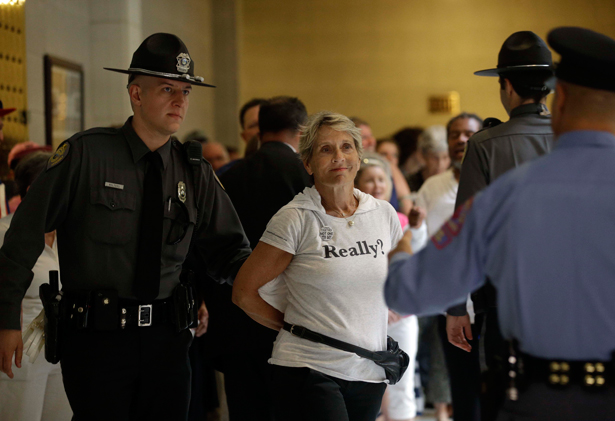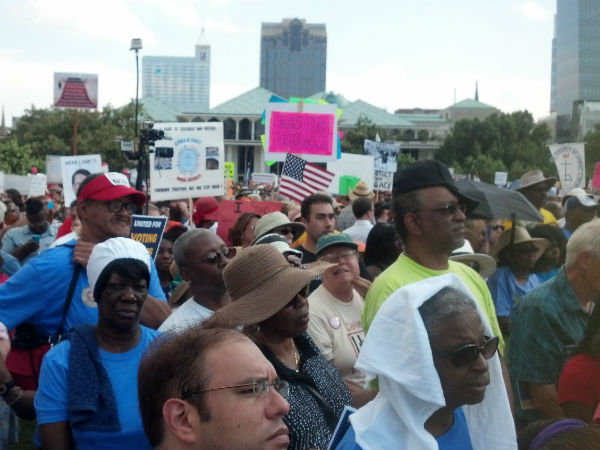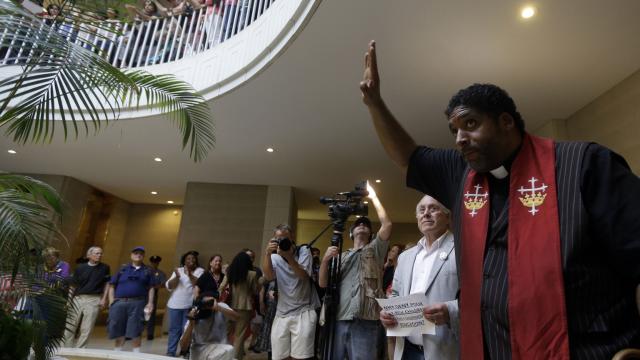
"You get the mountain folk, the city folk, the black folk, the Jewish folk, the working-class folk all together, this ultra-conservative stuff is over with." – Rev. William Barber
The Reverend William Barber, president of the North Carolina NAACP, is a charismatic, populist Southern preacher with fire in his voice and love in his heart. Every Monday, Barber and thousands of others gather for "Moral Monday" at the Halifax Mall outside the state legislature in Raleigh, North Carolina, to speak out against what Barber calls "immoral politics." I went to the 12th Moral Monday action, this one focused on the legislature's attacks on voting rights. Other than myself and some friends I met up with who drove down from DC, everyone I met there was from North Carolina.
In 2010, the GOP gained a majority in the legislature, and in 2012 Republican Pat McCrory was elected governor, giving Republicans control of the state for the first time since the 1800s. In the short time McCrory has been governor, the GOP has forced through unprecedented legislative attacks aimed at restricting women's access to abortions, cutting unemployment benefits, slashing education budgets, refusing federal Medicaid funds, raising taxes on the poor to cut taxes for the rich, controversial voting legislation that requires voters paying money to obtain a voter ID (which would disenfranchise 300,000 registered North Carolina voters), repealing child tax credits for parents whose children in college register to vote, and a bill that allows guns to be carried on playgrounds and college campuses. Even though these are largely Republican efforts, Rev. Barber is quick to point out that this isn't a partisan fight.
"It isn't about Republicans or Democrats, it's about extremists attacking Democracy," Rev. Barber said. "Their plan is to pass these immoral laws and then make it difficult for people to vote them out in the next election cycle."
North Carolinians say the Moral Monday protesters are now more popular than the state legislature. North Carolina's Moral Mondays could be a way for the South to become progressive again. Here are nine ways those fighting plutocratic governments can organize a popular grassroots movement to make lasting change.
1. Take the Moral Upper Hand
The movement Barber and others organized in North Carolina is rooted in righteous passages from the New Testament where Jesus talks about how it's easier for a camel to pass through the eye of a needle than for a rich man to get into heaven. In Matthew 25:31, Jesus said those who neglect to care for "the least of these," also neglect Him. Luke 3:11 quotes John, who says someone who has two coats should give one to someone who has none, and those with extra food should do the same for the hungry.
"The South is very religious, and so the 'Moral Monday' inclusion of religious principles is very smart," said Harvey Smith of Lillington, N.C., an atheist who was arrested at the Moral Monday protest on July 15. "But it may not be the best model for the rest of the nation."
Moral Monday participants include Catholics, Jews, Unitarian Universalists and Methodists. But for people like Harvey Smith, the movement also draws its strength from simple secular humanism, and the basic ideal that people have the fundamental rights to food, shelter, education, basic healthcare and the vote. Rev. Barber says taking the moral upper hand is fundamental to winning the struggle.
"A lot of liberals tend to run away from the Bible and the flag," Barber said. "But we need to take those things back, and not let people who hurt others through the politics of greed to claim what was never theirs in the first place."
2. Target State Capitols
"The real power isn't in the federal government, it's in the states. If you want to change the nation, you have to do it at the state capitols." - Rev. William Barber
In 2010, I was still the state capitol reporter for Mississippi's NPR affiliate network, the same year Tea Party Republicans would sweep the midterm elections and win majorities in statehouses and governor's offices. Haley Barbour, then governor of Mississippi, is still a legendary GOP strategist, perhaps best known for his role in engineering the first Republican takeover of the U.S. House of Representatives after the 1994 midterm elections as chairman of the Republican National Committee. Barbour was also the brainchild of the plutocratic takeover of Congress and state capitols in 2010 as chairman of the Republican Governors' Association.
That Summer, I was on assignment at the Neshoba County Fair, an annual Republican-dominated political picnic in Philadelphia, Mississippi, where Ronald Reagan delivered his infamous "States' Rights" speech to crowds of cheering Mississippi Republicans in August of 1980. I ran into Gov. Barbour at a press gaggle, where a fawning TV reporter asked him when he was going to announce his candidacy in the 2012 presidential race. Barbour simply smiled an aw-shucks grin and said, "As RGA chairman, I need to concentrate on getting Republican governors elected in 2010. Then maybe we'll see."
Barbour never announced a run for president, but he did successfully get ultra-conservative governors elected in traditionally purple states like Pennsylvania, Ohio, Florida, Wisconsin, and Michigan, among other states. Almost like clockwork, these governors, assisted by GOP majorities in their respective states, started enacting the agenda of the American Legislative Exchange Council (ALEC) to the letter. Whether it's Scott Walker, Rick Scott, Rick Snyder, John Kasich or Tom Corbett enacting the policy, the agenda is always the same. Taxes for the rich and corporations are cut, creating big budget gaps, providing those governors and legislatures with an excuse to slash budgets for government programs that the poor and underserved depend upon.
"This is the new form of the 'Southern Strategy' that they used back in the sixties," Rev. Barber said. "[Lee] Atwater confessed to it before he died, to get it off his chest. He said the best way to win an election was to say the 'N' word more times than the other guy. Nixon's Southern Strategy was instead to not say the word at all, but to use certain keywords that would set off the right group of voters."
In his speech at the 2012 Conservative Political Action Conference (CPAC), Wisconsin governor Scott Walker spoke of eliminating "dependence on government," which Huffpost described as "dorm room 'makers vs. takers' arguments." McCrory and the North Carolina GOP are simply taking advantage of their numbers to enact a similar agenda aimed at disenfranchising certain groups of people by not only slashing the programs meant to help them, but by making it more difficult for those groups of people to vote them out of office. The sooner we realize this is a nationally-coordinated agenda that depends on state governments to do the scut work, the sooner we can organize to take back our state governments.
3. Be Intersectional
"Somebody say, 'I cannot change things. Only WE can change things.' We are the WE that we've been waiting for." - Rev. William Barber
The thousands at the Halifax Mall were some of the most diverse of any group of protesters. Though the event was organized by the NAACP and legal help was provided by the civil rights group The Advancement Project, I saw members of clergy from a vast swath of faiths. I met Presbyterian ministers, Catholic priests, Muslim Imams, Unitarian Universalists, Jewish Rabbis, and Methodist preachers. There was a group of LGBT activists holding up rainbow flags. There were families with children from all nationalities. There were Latinos, Asian-Americans, and Middle Easterners standing alongside their fellow black and white protesters. I met a teenager who was upset her mom wouldn't let her join those who had committed to civil disobedience, and a 78-year-old woman who happily volunteered herself to be handcuffed and hauled off to jail while standing up for her rights.
Even though all the people there were from different class backgrounds, religions, sexual orientations, and ethnicities, they all had one thing in common - their righteous struggle for justice.
"Poor people, working class people, transgender people, are all tied into this oppression from people like the Koch Brothers," Harvey Smith said. "They want to use us as a bellweather to roll out these programs all across the country. And we won't stand for it."
Intersectionality is also a key part of having as many available assets as possible to help win your fight. Because so many groups are so deeply invested in the fight in North Carolina, all the bases were covered. The Christian Faith Baptist Church provided the space for the meetings before and after the action. During the large rally at Halifax Mall, there was a DJ playing music between speakers and a medical tent staffed with doctors providing free care to anyone who needed it. The NAACP provided the buses for people to go to and from the church. Volunteers waited outside the Wake County Jail to support those leaving, and offered the freed jailbirds rides back to the church. The Advancement Project provides plenty of attorneys ready to take on pro bono cases for the approximately 1,000 protesters who have been arrested over 12 Moral Mondays. None of these necessary logistics would be possible without an all-inclusive environment.
4. Use Music and Creativity
When we arrived at the church for the meeting before the action, we were all given music and lyric sheets for the song "Forward Together," which we sang several times. Musicians brought drums and keyboards to the church, where we sang joyous songs of protest and justice as we got ready to join the crowd at Halifax Mall.
Singing and music are common languages that bring all sorts of people together from all ages and backgrounds. And when everyone is joining their voices together as one, it adds an entirely new element of power that would have been absent otherwise. I recently wrote an article about the power of revolutionary music to stir revolutionary movements, which began with a James Connolly quote about how a revolution without musical expression is "the dogma of the few and not the faith of the multitude."
Protesters' creativity also shone at Halifax Mall, where people passed out humorous fans made to look like Gov. Pat McCrory's head. Another group had a table advertising a new Tumblr page, "Our North Carolina," in the vein of the "We Are the 99 Percent" Tumblr that launched Occupy Wall Street's rallying cries into the mainstream conversation. At the table, participants filled out a sheet of paper that says "My North Carolina" at the top, and allows the rest of the blank sheet to be filled in by the participant. Photos of these are then shared on social media to amplify the voice of the movement.
5. Use Bottom-Up Organizing, Not Top-Down
"We don't need celebrities to 'helicopter in' from New York and DC to speak at a rally, or for big groups to pour money into the movement. The best way to help the movement grow is to talk about it face-to-face, to your family and friends. Let them see you go to jail, and they'll start to think differently about what they believe." - Rev. William Barber
The bottom-up approach was key to Occupy Wall Street's success in spreading its message to every American city. Even though the first OWS encampment was in New York City, it was made very clear that each community was just as empowered to take the Occupy name, apply it to their town, and make the movement their own. All decisions were made democratically, with emphasis on input from traditionally-disenfranchised groups. Even after police evicted encampments with help from the Department of Homeland Security, the Occupy movement lives on through its actions, thanks to its bottom-up approach to organizing.
Rev. Barber insists that to be successful, the movement must remain a grassroots coalition of multiple groups, and not become an organization in and of itself.
"We want to build a movement, not argue over who's going to be president and who's going to be treasurer and all this," Rev. Barber says. "That's the difference between movements and organizations."
Even though Rev. Barber is the charismatic leader of the songs and chants, the decision-making is left up to the all the groups involved in the action. And because so many are involved and so many have invested resources into the movement, the Moral Monday actions pick up steam each week as groups work with one another to increase turnout and constantly improve logistics and coordination of events. Due to the structure of the movement, Moral Mondays are a heavily-local, meticulously-organized, grassroots model of action that will only pick up steam as time goes on.
6. Go to Jail for Justice
"Have you been to jail for justice? I want to shake your hand.
Because sitting in and laying down are ways to take a stand.
Have you sung a song for freedom? Or marched that picket line?
Have you been to jail for justice? Then you're a friend of mine."
- "Have You Been to Jail For Justice," by Peter, Paul and Mary
In just 12 weeks, nearly 1,000 North Carolinians have been arrested at Moral Monday protests, making it the single largest act of civil disobedience since the Occupy Wall Street movement. At Moral Monday, they don't refer to it as getting arrested, but as "bearing witness." I decided that if I was going to make the drive to North Carolina to write about Moral Mondays, the story would be incomplete unless I volunteered to be arrested and wrote about the experience from handcuffs to jail to release.
"In my tradition of faith, when one stands up to issues and injustice, one is willing to submit to anything, including crucifixion," Rev. Barber says. "You do it because you believe it is right and your crucifixion will be vindicated."
On July 22, 73 of us were "witnesses" at the state capitol. This process involved going to the Christian Faith Baptist Church around 3 p.m. on Monday, where the crowd was divided between supporters and "witnesses," the latter receiving a green piece of cloth to tie around their forearm to signify their intent to be arrested. Lawyers from the NAACP and the Advancement Project meticulously prepared everyone for the process, describing what kind of handcuffs they bind your hands with, the fact that capitol police allow your hands to be cuffed in front if you wish, the charges that will be filed against you, and the environment at the Wake County Jail.
When protesters were preparing for their arrest, they walked into the rotunda with the rest of the crowd at approximately 6 p.m., led chants, gave speeches, and sang songs at the doors of the House of Representatives and the Senate. Chief Weaver of the General Assembly Police sounded an LRAD siren and announced that the capitol was closed, and that protesters had 5 minutes to leave or face arrest for trespassing. When everyone else left, those with green armbands were bound with plastic cuffs and taken into the capitol cafeteria in the basement for processing, and hauled off to Wake County Jail in Department of Corrections buses with mesh grilles welded over the windows (Rev. Barber called the buses "limousines" when describing the process.)
Once we were hauled inside the Wake County jail, our plastic cuffs were cut off of us (any sort of movement pulls the cuffs tighter, which cut off circulation in my right hand for a few minutes) and we were thoroughly patted down before being led to additional processing rooms. The guards were all mostly supportive of our cause, understood what we were doing, and worked to process us through the system as quickly as possible.
One elderly man who was arrested with us named Bob Plummer (seen in this photo) was the very first Black Naval officer to do an underwater detonation in a war. He was one of the few who asked to be cuffed in front. When 8 of us men were being handcuffed to a chain to be led into the next processing room, the prison guards let Plummer, who walked with a cane, walk on his own without being handcuffed to the chain with the rest of us.
Tanya Glover, Harvey Smith's daughter and blogger for modvive.com, which covers the Moral Monday protests, was arrested with her father at the North Carolina statehouse on July 8th. She said her family all volunteered themselves to "bear witness" the following week.
"A lot of them didn't really get what was going on until they saw us being arrested, then when they understood what was really at stake, they had to get arrested too," Glover said.
Glover's husband, Anthony, was arrested on July 15th. Her sister in law, Lisa Dembow, and her two nephews, Dustin Bailey, age 17, and BJ Bailey, age 16, all committed acts of civil disobedience. Harvey Smith's wife, Jane, was also arrested with Tanya Glover's in-laws on July 15th. Now they're all spreading the word to their community about why they got arrested.
"Harnett County is like a world away from everywhere," Glover said. A lot of people have not really understood what's going on, and they don't hear what's going on because they're uneducated about our state and what the government is doing. It's our job to go back to our county and really spread the word."
7. Lead With Love
Love overshadows everything happening at Moral Monday. They protest out of love for those being affected by the legislature's new laws, they stress not antagonizing police officers doing their job, and they stress nonviolence toward others who may not be sympathetic and toward any legislators they may confront.
Love and support were also key roles to be filled by the crowd, from when the "witnesses" first marched toward the capitol to when we were hauled off to jail to when we got out. At a certain point during the rally, a member of the clergy offered a prayer over the group for their safety, and the crowd divided to make one aisle in the middle where all of the "witnesses" would walk two by two toward the front door of the capitol. People on either side of us were saying thank you, clapping, giving us high fives, hugs, and fist-bumps. Several spontaneously joined us from the sidelines and volunteered to be arrested with the group.
I was blown away by the thousands of people all erupting into cheers and chanting "Thank you! We love you!" while walking from the processing room in the basement of the state capitol to the prison buses with my hands bound behind my back. Instead of the walk to the bus and ride to jail being humiliating or dehumanizing, it was empowering. The mood of my fellow male "witnesses" on my bus instantly improved, and morale stayed high after we saw the crowd. We sang songs, told jokes, and didn't take any of it too seriously.
Because of my long protest-related arrest record in many states, I was one of the last protesters to be released. But even close to midnight, there were still roughly 20 people waiting outside the Wake County jail who applauded when I walked out the front doors with my court papers. State senator Earline Parmon (Democrat of Winston-Salem) was the first to give me a hug after I was released. There were Advancement Project attorneys present, along with a notary public, to sign and notarize my court appearance waiver, (hopefully) making it so my attorney could appear on my behalf when my court date arrived. One of the jail supporters had a live video chat going with the Dream Defenders currently occupying the Florida state capitol, who congratulated me through the screen on my release. The atmosphere of love that constantly surrounds the Forward Together movement makes it easy to sympathize with them, and difficult to dislike them. They'll likely win over North Carolina's apolitical class simply with their love.
8. Register New Voters, Support Independent Candidates, and Get Out the Vote
While there's already a lot of talk as to who will run against the Republican incumbents in the legislature, or who will challenge Pat McCrory in 2016, the new congressional and state legislative redistricting maps drawn by North Carolina Republicans aim to gerrymander the GOP's way into another four years of supermajority rule. Reverend Barber says their redistricting plans are just a way to further disenfranchise poor communities and people of color.
"The new redistricting map undermines the work we've been doing for twenty years bridging racial gaps in North Carolina," Barber said. "That's an attack on Democracy."
While I was preparing for arrest, my Facebook friend Mike Cockrell (who was kind enough to host me at his home for two nights) conducted a survey of 54 people at Halifax Mall regarding their voting habits and political leanings. He made sure to question as diverse a group as possible. The survey participants were from 15 different counties in North Carolina. He asked them five short questions with an option of yes/no/not sure:
Do you vote?
Have you voted for a Republican at any point in your life?
Did you vote for a Republican in the last election?
Are you likely to vote for a Republican in the next election?
Would you consider voting for a third party candidate if they were on the ballot?
The answers to Mike's survey surprised both of us. All but one of the 54 people surveyed said they were voters. 43.4% had voted for a Republican at least once in their life. 18.9% of respondents voted for a Republican in the 2012 elections. 9.4% of participants said they would consider voting for a Republican in the next election. And a whopping 81.1% of respondents said they would consider voting for a third party candidate. Only 7.4% of survey takers said they wouldn't vote for independent candidates.
"I am a registered independent. If there was a leftist third party, I would love to have that," Harvey Smith said. "I remember when I was growing up in New York, there were sometimes ten parties on any given ballot. I'm really into breaking out of this two-party mold."
The only way to ensure the current crop of lawmakers doesn't maintain their power is to vote them out at every opportunity. The Moral Monday protests could be a great engine not just for registering new voters, but for cultivating strong community leaders to run for local office.
9. Have an Agenda-Driven Movement
One of the chief criticisms of the Occupy movement was that it had no central, core demands. Occupy activists would often retort with the oft-repeated line, "All our grievances are connected," and even created an infographic that showed how every grievance was tied into the cause. However, it still can't be denied that the diffuse nature of Occupy meant a lot of the original populist energy against the bailouts and a bought-and-paid-for government was siphoned out of the movement once every grievance was looped in. It became about everything instead of focusing on a few key goals.
Even though they're rooted in protesting a multitude of attacks from the legislature, Moral Mondays have a specific focus for each given week. On the July 22nd demonstrations, the theme of the week was voting rights. Other themes for Moral Mondays have focused on a woman's right to have access to contraception and abortions, and others focused on the raising of taxes on the poor to cut taxes for the rich. Rev. Barber cited the Constitution when addressing the legislature's attempts to pare back unemployment benefits.
"North Carolinians have a right to the fruits of their labor in their Constitution," Rev. Barber said. "You can't deny someone unemployment benefits after they've spent years paying into it. That's directly denying someone the fruits of their labor."
In Wisconsin, where I live, the problem is similar: Gov. Scott Walker and the GOP-dominated legislature have attacked everything from voting rights to abortion access to public education. But rather than reacting to each individual attack from politicians, it should be the duty of the movement to focus on each one in a given week, and constantly make the connection that it's tied together as part of the ALEC agenda followed to the letter by multiple states with plutocratic governors and legislatures. You can be diffuse in your focus, but make specific demands with each separate protest. When people feel like there's a winnable goal in their sights, they are more energized to win instead of feel defeated, burned out, and overwhelmed.
As Harvey Smith said, the Moral Mondays of North Carolina can only be done in North Carolina. But a similar model can be very successful in many other states. We can take back our government before we know it if we organize this new civil rights movement the right way.
3 WAYS TO SHOW YOUR SUPPORT
- Log in to post comments


